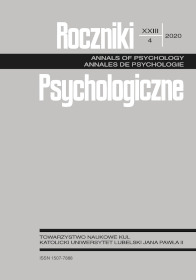A Polish Adaptation and Validation of the Distress Tolerance Scale
A Polish Adaptation and Validation of the Distress Tolerance Scale
Author(s): Marta Rokosz, Ryszard PoprawaSubject(s): Social Sciences, Psychology, Personality Psychology
Published by: Towarzystwo Naukowe KUL & Katolicki Uniwersytet Lubelski Jana Pawła II
Keywords: distress; distress tolerance; Polish adaptation; questionnaire validity
Summary/Abstract: Distress Tolerance Scale (DTS; Simons & Gaher, 2005) measures individual differences in experiencing and enduring negative emotional states. It consists of four dimensions: tolerance of perceived distress, assessment and acceptance of emotions, absorption of attention, and emotion regulation. The study aimed to evaluate the psychometric properties of a Polish adaptation of the Distress Tolerance Scale (DTS). A total of 1,210 individuals aged between 18 and 69 participated in the study (45% men, 51% women). After obtaining a Polish translation, we conducted EFA and CFA to examine the validity of the construct. EFA revealed a two-factor structure of the DTS, with Regulation as a separate factor. The original and modified CFA model with Regulation as a separate first-order factor showed an unsatisfactory fit to the data. Better CFA parameters were obtained with the reduced, three-factor version of the DTS. Four- and three-factor versions both show good internal consistency, temporal stability, convergent, and discriminant validity, with the exception of the Regulation subscale. As expected, distress tolerance is positively associated with positive affectivity, satisfaction with life, and self-control ability, but negatively with negative affectivity, perceived stress, and difficulties in emotion regulation. Men declared higher levels of distress tolerance than women. The Regulation subscale showed the weakest validity results; in terms of content, it seems to deviate from the concept of distress tolerance. With all those findings in mind, we recommend the valid and reliable three-factor version to be used in further studies.
Journal: Roczniki Psychologiczne
- Issue Year: 23/2020
- Issue No: 4
- Page Range: 347-366
- Page Count: 20
- Language: English

